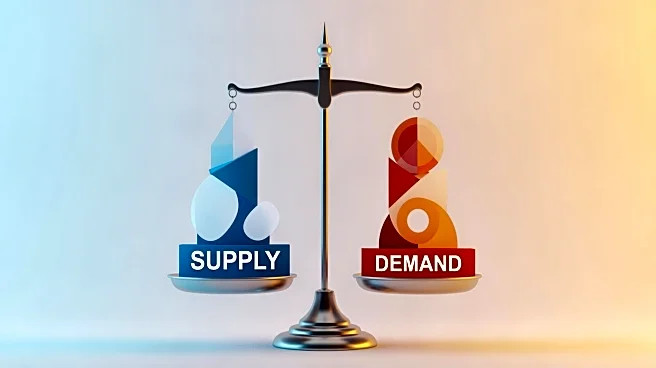What is the story about?
What's Happening?
The U.S. Department of the Treasury is evaluating how to best utilize the substantial revenue generated from tariffs imposed by President Trump. These tariffs, which include 100 percent on pharmaceutical drugs and varying rates on other goods, are expected to bring in approximately $30 billion monthly. The tariffs were introduced as part of a broader strategy to strengthen the U.S. economy, particularly its manufacturing sector. The Treasury Department reported a record $29.5 billion in tariff revenue for August, marking the first full month of the new tariffs. The administration is considering several options for deploying these funds, including tax incentives for domestic manufacturers, broad-based tax cuts, or reducing the national budget deficit.
Why It's Important?
The deployment of tariff revenue is crucial as it could significantly impact the U.S. economy. Using the funds to support domestic manufacturing could bolster job creation and enhance competitiveness against foreign imports. Alternatively, tax cuts could alleviate the financial burden on consumers facing higher prices due to tariffs. Reducing the budget deficit could stabilize the economy by lowering borrowing needs, potentially decreasing bond yields and interest rates. This could strengthen the dollar and secure long-term U.S. economic solvency, reinforcing its global financial leadership.
What's Next?
The Treasury Department must decide on the most effective use of the tariff revenue. Stakeholders, including manufacturers, consumers, and policymakers, will likely influence this decision. The choice will determine the economic trajectory, affecting inflation rates, manufacturing growth, and fiscal stability. The administration's decision could also impact future trade policies and international relations, as tariffs remain a contentious issue globally.
Beyond the Headlines
The ethical and strategic implications of tariff revenue deployment are significant. Supporting manufacturing aligns with national economic goals but raises questions about market intervention and fairness. Tax cuts could provide immediate relief but may not address long-term economic challenges. Reducing the deficit could enhance fiscal responsibility but requires careful balancing of national priorities. These decisions will shape the U.S.'s economic landscape and its role in global trade.
















